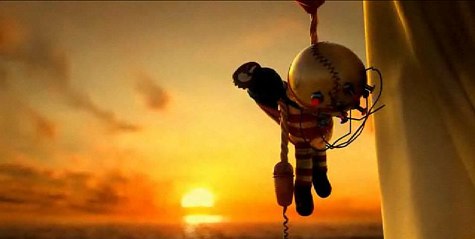
There is an ongoing argument about whether games can be considered as literature, and this one presents by far the most compelling case yet for "yes".
A quotation from the Guardian review of Bioshock 2. It’s a cracking example of a style of games writing that I hate.
Why don’t I like this kind of writing? Because it never addresses the gameness of a game; it breaks it down into component parts – story, graphics, sounds – that feel familiar from other disciplines, and are inevitably criticised as such. “Gameplay” – a catch-all term describing rules, mechanics, the systems present in a work that is inherently systematic – is separated out from these other elements. This review simply disguises its formulaic, old-fashioned style with some breathless hyperbole and purple prose – “some of the best combat dynamics in the business” is simply a tarted-up version of the meaningless “the gameplay is really good“. This is usually – I say usually, having dipped into this style myself – an attempt to make the writing seem more “worthwhile” to a mainstream audience, perhaps even a non-games audience. But Nicky Woolf’s writing, despite its ambition, is a far cry from my favourite “mainstream” games writer: John Lanchester in the LRB. Though I don’t always agree with him, Lanchester’s writing is smart, informed, and never once defensive.
But what really, really ticks me off is that this article doesn’t deliver on its message: why is it that ‘story’ is considered the key element of games’ “maturity”? After all, story isn’t the only thing that contributes to game-ness. Bioshock 2 is a shooter – a very good shooter, sure, with some tactical elements harking back to Halo‘s balance of left-hand/right-hand, direct/indirect – but it’s still a game where you spend most of your time shooting monsters in the face.
And it is difficult to explain how such a (relatively) generic style of gameplay contributes to a “compelling case” for this “being literature“. After all, playing – or should be – the majority of what you do in a game.
I am not complaining: “involving shooting” does not make a game bad; it does not even necessarily make it immature – and I’d rather be shooting monsters in the rich, well-realized, faded-deco world of Rapture than as another identikit Space Marine. Rather, there’s a much simpler issue at stake:
I don’t want my games to be literature.
I want them to be games. I want to know why a game is good as a game, not as an alternative to reading a book or watching a movie. When I want to read a book, I will, because I like books and I like them for things only they can do. When I want to watch a movie, I will, because I like movies, and I like them for things only they can do.
When I want to play a game, I will, because I like them for things only they can do. I do not want games to become literature, just as I do not want them to become cinema. I expect Woolf’s use of the word literature was meant to be a statement of quality, rather than of medium – but I think the fact that Woolf uses it qualitatively is telling, and perhaps even defensive. And that’s why I bang on like this: there’s no need to be defensive of a medium in the criticism of an artefact. You won’t have to reach for the thesaurus quite so much, or remind the reader that the medium might be worthwhile, if you celebrate things as themselves, on their own merits. Celebrate game-ness.